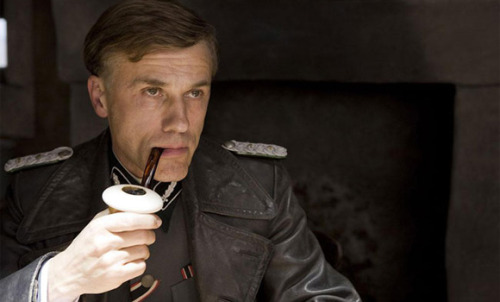
Review by Jack Ferguson.
As a filmmaker Quentin Tarantino has spent his career playing with some of the played out staples of conventional cinema, and trying to make them into something fresh and exciting. Previously he’s done it with gangsters and crime, blaxploitation and martial arts movies. His latest, Inglourious Basterds, is his take on the war movie, as well as the spaghetti western.
Basterds is a reminder of all the things Tarantino can do incredibly well-make a visually exciting, brilliantly scripted work of interlocking, exciting plots. It also contains all the things that give me reservations about him as a filmmaker-the casual sadism that actually led feminist groups to picket his last film, Death Proof.

Brad Pitt stars as Aldo Raine, leader of the Basterds
The ads for the film pitched it as an action movie starring Brad Pitt, but this would appear to be more a function of the Hollywood star system and PR industry-Brad Pitt is the most famous so he goes top of the bill. Playing the leader of the eponymous Basterds, a team of Jewish American commandoes dropped into Nazi occupied France to commit atrocities and terrorise the Germans, Pitt is certainly not the star of the film.
In fact, very little of the film depicts actual warfare, which is probably because it takes place in a fantasy, alternate history version of World War 2, where vents in 1944 play out very differently from the way they actually did. The stronger of the plots contained within the film is about the sole survivor of the massacre of a hiding Jewish family, and the eventual opportunity she is given for revenge on the Nazis.

Though not technically a “Basterd”, Melanie Laurent plays the most important role in the film – a Jewish survivor out for revenge against the Nazis
The film is split into a number of acts that introduce the different elements in play that eventually come together in a triumphant climax. The opening chapter is given the title ‘Once upon a time in Nazi occupied France,’ which points out its homage to the westerns of Sergio Leone, which recurs throughout the whole film. In a scene reminiscent of so many spaghetti westerns, right down to the Ennio Morricone music, a farmer outside a remote cottage watches the approach of threatening presences from the horizon. In this case though they aren’t gunslingers on horseback, but Nazis on motorbikes.

The simultaneously terrifying and hilarious SS “Jew Hunter”, Hans Landa
In a 25 minute long scene that is one of the strongest in the whole film, he is then manipulated by the suavely menacing Col. Landa of the SS. The dialogue is brilliantly written, and takes advantage of the fact that the film actually has characters using their own language (Germans speak German, French French etc.) to build the tension. As the stoic farmer attempts to stonewall the ‘Jew Hunter’ as the Colonel freely admits he is called, he is slowly undone by Landa’s sinister genius. The climax of the scene is perhaps the only genuinely shocking bit of violence, as opposed to just unpleasant.
Christoph Waltz, apparently an Austrian TV actor being given his first big cinema break by Tarantino, is one of the real stars of the film, and delivers a brilliant performance as the truly hateful SS man.
It’s only after this that we actually meet the Basterds, as they are recruited by Pitt’s Lieutenant Aldo Raine, who gives them a speech about how they are going to scalp and terrorise the Nazis that reminds you of the George C Scott in Patton. As we see their antics behind enemy lines we also get to learn how they are infuriating a slightly cartoonish version of Hitler.

“The Bear Jew” – a particularly sadistic basterd who likes to beat Nazis to death with a baseball bat. Probably the best thing Eli Roth will ever do
One of the elements that left me uneasy in the film was Raine’s second in command, Sergeant Donnie Donnowitz, known to the Germans as ‘the bear Jew’ for battering in the heads of prisoners with a baseball bat. The character is played by Eli Roth, previously most noticed for directing the torture porn horror ‘Hostel’ films. After beating a prisoner to death he is portrayed as a little unhinged, straining to shout a baseball commentary on his own violence. But at nearly all other times in the film this seeming insight into why he behaves this way is lost, and he acts just like any other solid dependable war movie man.
The other thing that is discomforting is the little flashes we get of Tarantino’s misogyny. I do think he’s a great director, but he also undoubtedly has some serious issues with women. Although in this film he never goes as far as he does in some other films, there are scenes of torture and murder in this film that leave you wondering about what is going on in his head.

Melanie Laurent prepares herself for righteous vengeance against the Nazi high command
The two stories come together in two separate plots to assassinate Hitler and the Nazi top brass at a premiere of a Goebbels directed propaganda film. Tarantino takes the chance to express his love of cinema in this, with one character explaining why she puts a German director on the sign despite her hatred of the Germans with “In France we respect directors.” In the films climax the cinema itself is destroyed by igniting highly flammable film, consuming the Nazis who have defiled it with a puerile propaganda piece.
Special mention should be made of another practical newcomer Melanie Laurent, who plays the cinema owner plotting revenge on the Nazis, and Daniel Bruhl, familiar to socialist cinema fans from films like The Edukators and Goodbye, Lenin!. Bruhl plays a German soldier who is the star of the propaganda film, and is a Nazi celebrity for his war exploits. He practically stalks Laurent’s character, but this is in fact what gives her the opportunity for revenge. During the premiere, we appear to see Bruhl’s character troubled by himself on screen, but perhaps disappointingly this is only hinted at and we never understand him in greater depth.
At its best, a war film can really examine the logic and meaning of human violence. This film is not profound in that way. For a long time the Second World War has been the arena where boys can legitimately play out fantasies of violence because no one can deny the Nazi’s evil. Indeed WW2 has been used again and again to try and explain less justifiable wars because it is perhaps one the few wars that you could argue was just. I’ve often wondered if this will continue as it fades from living memory. However, perhaps the fear should be that, as the WW2 generation finally disappears, it will turn into more of a mental playground disjointed from historical reality.
However, that shouldn’t detract that Inglourious Basterds is still a great film despite its flaws. In the same way that The Good, the Bad and the Ugly or Once Upon a Time in the West are great films, it is a brilliantly scripted and shot suspenseful thriller that’s well worth a watch.

![]()








 Entries (RSS)
Entries (RSS)